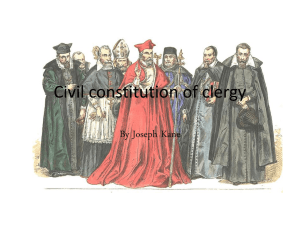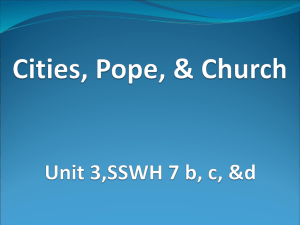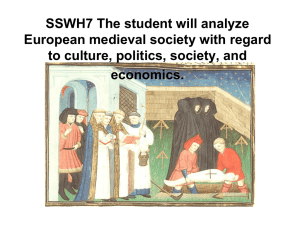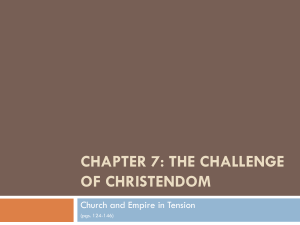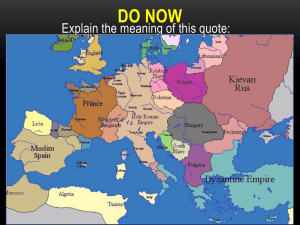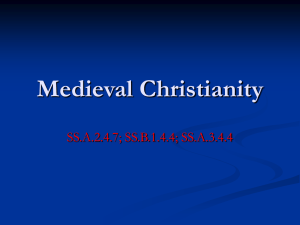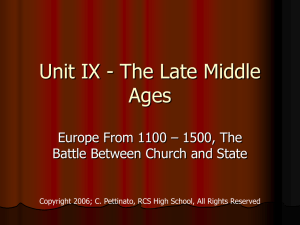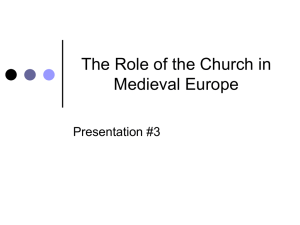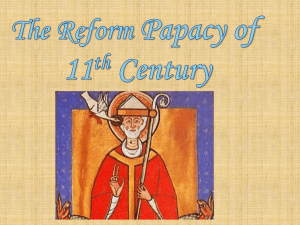Use these plays to answer questions on Acts I-IV
advertisement
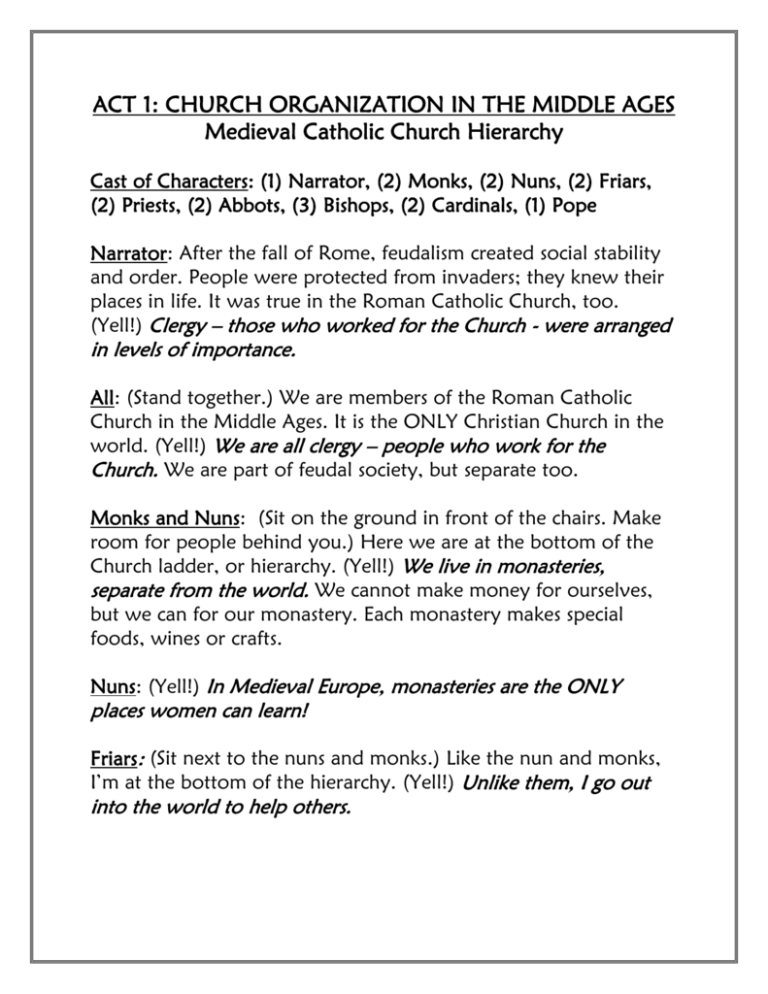
ACT 1: CHURCH ORGANIZATION IN THE MIDDLE AGES Medieval Catholic Church Hierarchy Cast of Characters: (1) Narrator, (2) Monks, (2) Nuns, (2) Friars, (2) Priests, (2) Abbots, (3) Bishops, (2) Cardinals, (1) Pope Narrator: After the fall of Rome, feudalism created social stability and order. People were protected from invaders; they knew their places in life. It was true in the Roman Catholic Church, too. (Yell!) Clergy – those who worked for the Church - were arranged in levels of importance. All: (Stand together.) We are members of the Roman Catholic Church in the Middle Ages. It is the ONLY Christian Church in the world. (Yell!) We are all clergy – people who work for the Church. We are part of feudal society, but separate too. Monks and Nuns: (Sit on the ground in front of the chairs. Make room for people behind you.) Here we are at the bottom of the Church ladder, or hierarchy. (Yell!) We live in monasteries, separate from the world. We cannot make money for ourselves, but we can for our monastery. Each monastery makes special foods, wines or crafts. Nuns: (Yell!) In Medieval Europe, monasteries are the ONLY places women can learn! Friars: (Sit next to the nuns and monks.) Like the nun and monks, I’m at the bottom of the hierarchy. (Yell!) Unlike them, I go out into the world to help others. Abbots: (Kneel in front of the chairs.) (Yell!) I’m in charge of a monastery. Because my nuns and monks can make my monastery wealthy, I am powerful. Priests: (Kneel in front of the chairs.) (Yell!) For ordinary people, life revolves around my church. I run the hospital and schools; I’m in charge of baptisms, christenings, weddings, funerals and saints’ days. Bishops: (Stand behind the priests.) (Yell!) I’m in charge of several parishes, churches and priests. Cardinals: (Stand on chairs.) I’m advisor to the most powerful leader of the Roman Catholic Church, the pope. (Look at the other cardinals and make the “thumbs-up” sign.) (Yell!) It’s our job to elect a new pope when one dies. Pope: (Stand on the table.) I’m elected by cardinals, but I have the most power. (Yell!) I think I’m more important than any king, because all kings must have my blessing to rule. No one may disagree with me, or I excommunicate them from the Roman Catholic Church. Excommunication is a ticket to Hell. All: (Yell!) The monarch and pope sometimes cooperated and sometimes fought for power. Let’s see how that happened in history. Pope Cardinal Cardinal Bishop Abbot Abbot M Bishop M F Priest F Priest N N ACT 2: MONARCHS AND PAPACY King Henry IV, Pope Gregory VII fight for power in 1075 Cast of Characters: King Henry IV, Pope Gregory VII, (2) Lords and (2) Bishops King Henry IV: The clergy are the only people who read or write, so I need them to help me run the government. But, I’m chosen by God to be king. As king, I should be able to appoint cardinals and bishops in the Roman Catholic Church. The Church serves me, I don’t serve the Church. Pope Gregory VII: (Walk in angry.) What’s this? You’re appointing cardinals and bishops? What gives you the right to appoint my people? No, King Henry, your pride affects your judgment. You do not have final authority from God, I do. From here on, I will appoint all clergy. (Storm out.) King Henry IV: (Speak to your lords and bishops. Angry.) What can I do? If I lose the ability to choose clergy, I lose power! It will be impossible to govern without people who read and write. Lords and Bishops: (Together.) We know! Here’s what you do. Declare Pope Gregory’s election a fraud; say he’s not really the pope because the election was rigged. People will follow you! Henry IV, Lords and Bishops: (Together.) People, hear us. Pope Gregory is not the real pope. Do not do what he says! Pope Gregory VII: (Enter.) Henry, I hear what you’ve done, and I excommunicate you from the Church. You have no place in Heaven. I’ll tell people they don’t have to obey you, because you’re a sinner! Lords and Bishops: (Running from the King to hide behind the pope.) Oh no! If Henry has no power in the Church and no power from the people, he has nothing! We must leave the king and follow the pope! King Henry IV: (Speak to yourself.) I’m in trouble, but I have a plan. (Kneel before the pope.) Pope Gregory, you are the highest priest, so I know you have to forgive me. It’s God’s law. Forgive me! Pope Gregory VII: (Speak to yourself.) I have to forgive him because it’s God’s law. But, if I forgive him, he has his power back. I’ll make him wait so long, he’ll give up. King Henry IV: (Still kneeling.) I’ll wait in the snow until you forgive me. I must remain king. (Shiver from cold.) Pope Gregory VII: (Leave, then return. Sigh. Speak to yourself.) After three days of watching the king kneel, the people begin to feel sorry for him. I must not let them take his side against me. (Speak to Henry.) You are forgiven! Pope Gregory VII and King Henry IV: (Speak to the audience.) A later king and pope will make a deal that the pope chooses bishops, but the king appoints clergy for the government. The deal is called, “The Concordat of Worms.” The deal doesn’t last long. King Henry IV: (Step forward.) Now, let’s see how an English king loses power because he is cruel and unjust. His cruelty will lead to the fall of feudalism. ACT 3: FEUDALISM UNRAVELS King John Signs the Magna Carta in 1215 Cast of Characters: King John, Lord 1, Lord 2, Lord 3, Guard 1, Guard 2 King John: (Speak to the audience.) We English kings are the most powerful in Europe, because we’re far from the pope. The pope has less power here and I have more! Lord 1: (Speak to King John.) A powerful king would be fine if he were good, but you’re not! You raise taxes until our serfs can no longer feed their families. We can’t defend our castles if we have nothing to eat! King John: (Angry.) What?! You dare question me? Guards! Guards: (Run in.) Yes, sire? Lord 1: (Frightened.) When will I be tried by a court? King John: Trial? You are a traitor! You will never be released! Guards, put him in the dungeon! (Guards take the lord away.) Lords 2 and 3: (To yourselves.) This can’t go on! Instead of using power to help his people, King John punishes personal enemies and drains our resources. But…he can’t control the country without us. We can force him to change if we work together! Lord 2: King John, meet your lords at Runnymede and be prepared to give rights to your people. King John: What is this? Have you not learned? Guards! Off with their heads! Guards: (Walk in and wait.) Yes, King John? Lord 3: If you kill us, other lords will take your throne by force. They’ll gather knights from all over the land to defeat you. You will lose your kingdom, King John! King John: (To the audience.) If I meet the lords at Runnymede, I’ll have to give power away. If I don’t meet them, they’ll take my throne from me! (Exit.) Lords: (All.) Here we are at Runnymede. King John, sign the Magna Carta – the Great Charter – or lose your throne! King John: (Enter.) What is it you want? Lord 2: Trial by a jury of our peers. Lord 3: Collect taxes with our approval. Lord 2: Habeus corpus, no prison without trial. King John: I am chosen by God! I decide to collect taxes, I decide guilt, and I decide who will be imprisoned – and for how long! I protect the kingdom! Lord 1: God chooses us all! Sign the Magna Carta! King John and Lords: (All.) From this time on, the monarch is no longer completely in control. Feudalism is no longer in balance; the feudal triangle begins to fall apart. ACT 4: ANOTHER FAILURE OF FEUDALISM Joan of Arc and the Hundred-Year’s War Cast of Characters: Advisor to King Charles VII, King Charles VII of France, English Lord, Joan of Arc, Narrator 1, Narrator 2 Narrator 1: English kings claimed French lands and invaded France in 1337. France fought back for 100 years, the Hundred-Years War. That war – and nationalism - was one of the reasons feudalism fell. Charles VII: (Speak to your advisor.) We’ve lost some territory in northern France to Henry V of England. My troops are losing courage after fighting so long. What can I do? Advisor: Your majesty, the 13-year-old girl is here again, the one claiming to have had visions from God. She believes she will save France from the English - with God’s help. Charles VII: If she’s really sent by God, she’ll see through a trick. Quick, trade places with me! Sit on my throne and pretend to be me; I’ll wear your robe to disguise myself. (They trade places.) Advisor: (Speak to Joan with a “kingly” voice.) What is it you need of me, Joan? Joan: (Walk past the “fake” king and kneel in front of the real one.) King Charles, God told me to lead your knights into battle. We French will win! Charles VII: (Surprised.) You must be sent by God to see through that trick! Joan, I will give you as many knights as you need! Narrator 2: Joan goes into battle against the English at Orleans. Joan: (Yelling to her knights with sword in the air.) Courage, men! Do not fall back, do not retreat! We will win! Knights: (Cheer.) We are defeating the English! We are winning! We will drive them out of France! Narrator 1: Joan is captured by English soldiers and brought before an English Lord for trial. She is in enemy hands. English Lord: Joan, we charge you with improper dress and heresy. Admit you violated God’s law by dressing as a soldier; admit God did not speak to you! We will release you! Joan: God spoke to me and I obeyed Him. Do with me what you will. English Lord: Take her away! She’s a witch! Narrator 2: Joan was burned at the stake for believing in herself, her God and her mission to save France. Her courage made the French people loyal to France rather than any manor. Narrator 1: That loyalty and pride is “nationalism.” Nationalism undermined feudalism’s demand that serfs and knights be loyal to lords. Narrator 1 and 2: Now, people saw a bigger view – a view upsetting the balance of feudalism.
